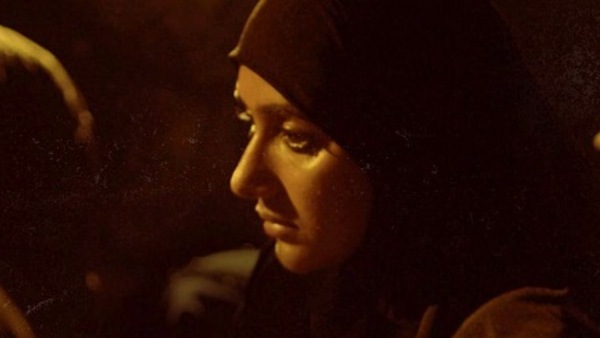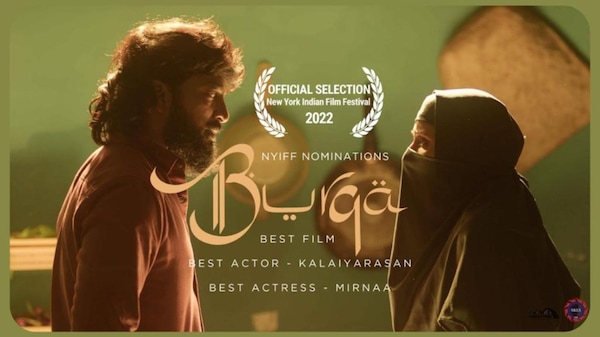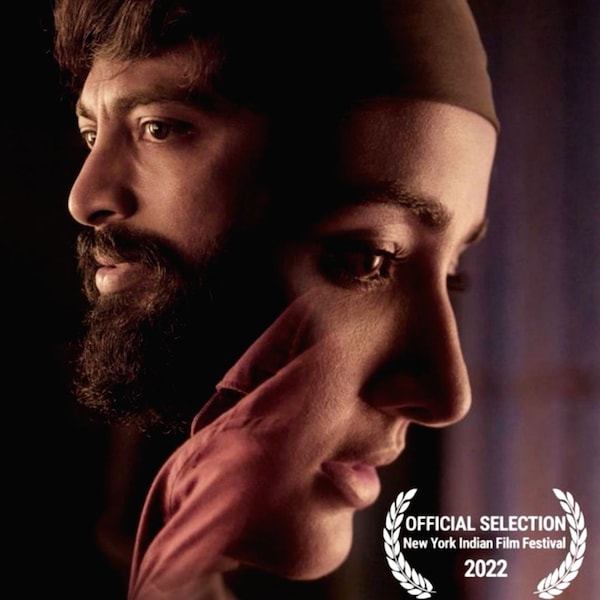Burqa movie review: Mirnaa Menon and Kalaiyarasan stand out in a slow-burn love story
Burqa premiered at the 2022 edition of the New York Indian Film Festival. Produced by SKLS Galaxy Mall Productions and Madras Stories, the film is directed by Sarjun KM, who rose to fame with his YouTube shorts, Lakshmi and Maa

A still from Burqa/Twitter
Last Updated: 05.22 PM, May 18, 2022
Story: Burqa, which has four characters, is set against the backdrop of a Muslim ritual that not many people are familiar with. The one hour-20 minute film, directed by Sarjun KM, revolves around 21-year-old Najma (Mirnaa), who meets a stranger, Suriya (Kalaiyarasan), under unlikely circumstances.
Review: Burqa opens with these lines: “The wind breathes lonely, longing to be seen. Sometimes, the soul has days like these.” This quote by Angie Weiland-Crosby pretty much sums up the premise of the film. Najma is like a caged bird. She lost her newly-married husband, Anwar. Naturally, she's consumed by grief. She is not allowed to be happy or hopeful. Something terrifying and gut-wrenching just happened to her. But strangely, nothing reminds Najma of Anwar. Except for the fact that he was a nice gentleman.
Najma wants to get out of the cage but doesn't know how to. She's scared of society. Understandable! She's in the dark, quite literally and metaphorically. Suriya comes into Najma's life as a ray of sunshine. Suriya, therefore, wants to set her free. Sarjun slowly and steadily establishes it.
Najma hears a persistent knock on the door. First, she's reluctant to open it, but eventually, does. Suriya is writhing in pain. He asks for water. Najma, being the compassionate person that she is, lets Suriya inside, and gives him first aid.
Suriya sees Najma wearing a burqa at her home. He asks her why, and she tells, "that's how it is". Suriya is an atheist. He kills people for money. On the other hand, Najma is kind, soft-spoken, god-fearing, and reads the Holy Koran. Also, she's from a nursing background. Both have different ideologies. It's these contrasts that make Burqa interesting to watch.
Najma is a bundle of contradictions. She's like any other woman. She's silent, yet burns with desire from the inside. Mirnaa is excellent. She transforms her character’s voidness into a kind of subdued force. Sometimes, she pushes forward, pushes against.
Najma doesn't show her emotions to Suriya, although he understands. He really does. Suriya likes Najma. He impresses her. She notices but seldom acknowledges that. This constant shuffling of emotions; partly the writing makes Burqa engaging. The writing allows a film that discusses ‘heavy’ concepts to breathe, in a quiet, unfussy way. Kudos to Anusuya Vasudevan.

In a scene, Suriya asks Najma, "If a man lost his wife, would he grieve the way you are grieving?" Burqa raises some valid questions about society, gender, religion, custom, etc. Najma wants freedom. She wants her career. She wants those same things society stole from her. The screenplay is vivid, yet appears (deliberately) unstructured. What sets Burqa apart is how everything is woven into the screenplay without feeling forced. They tell very often that grief is a process. They equate grief to a journey with no real end in sight. But the good thing is that grief teaches you quite a lot of things about yourself along the way, like it did to Najma.

Najma is comfortable in hijab. It is a matter of personal choice. And, it's beautiful how Suriya falls for Najma. He can't see anything, but just her eyes. Yet, he sees beyond the veil! There's something beautiful about the poetry of cinema, which deals with loss, despair, wistful longing and love. You could feel the pain that Najma was going through. You could feel what Najma and Suriya felt for each other. Every time Suriya senses Najma was feeling low, he lifts her from the abyss of sorrow. Without even realising, Suriya gives Najma some strength to move forward. She's not an easy person to deal with, mind you!
The natural, documentary-like cinematography (by G Balamurugan) complements the realness of these characters and moments, aided by tastefully-done background score. Kudos to Sivatmikha! I wish Burqa had gone after more. I wish the film had found a way to tell who exactly Suriya was. I wish I had known more about his likes and dislikes. Instead, we get a glimpse into what Suriya's mother was! In fact, I wanted to see how Najma's attitude towards Suriya changes after knowing Suriya's past relationships and love. I wanted to see more conflicts between them.
Verdict: Burqa is one of those films that reminds you that one doesn't have to be strong to brace through the loss of a loved one. You can be weak; feel powerless and still, move on with life. The process, in itself, will empower you. Amid mediocre big-budget films that choke theatres every Friday, I'm glad that I caught Burqa, which provided me with a sense of fulfilment.
(This independent Tamil film premiered at the New York Indian Film Festival 2022 recently.)
Subscribe to our newsletter for top content, delivered fast.
